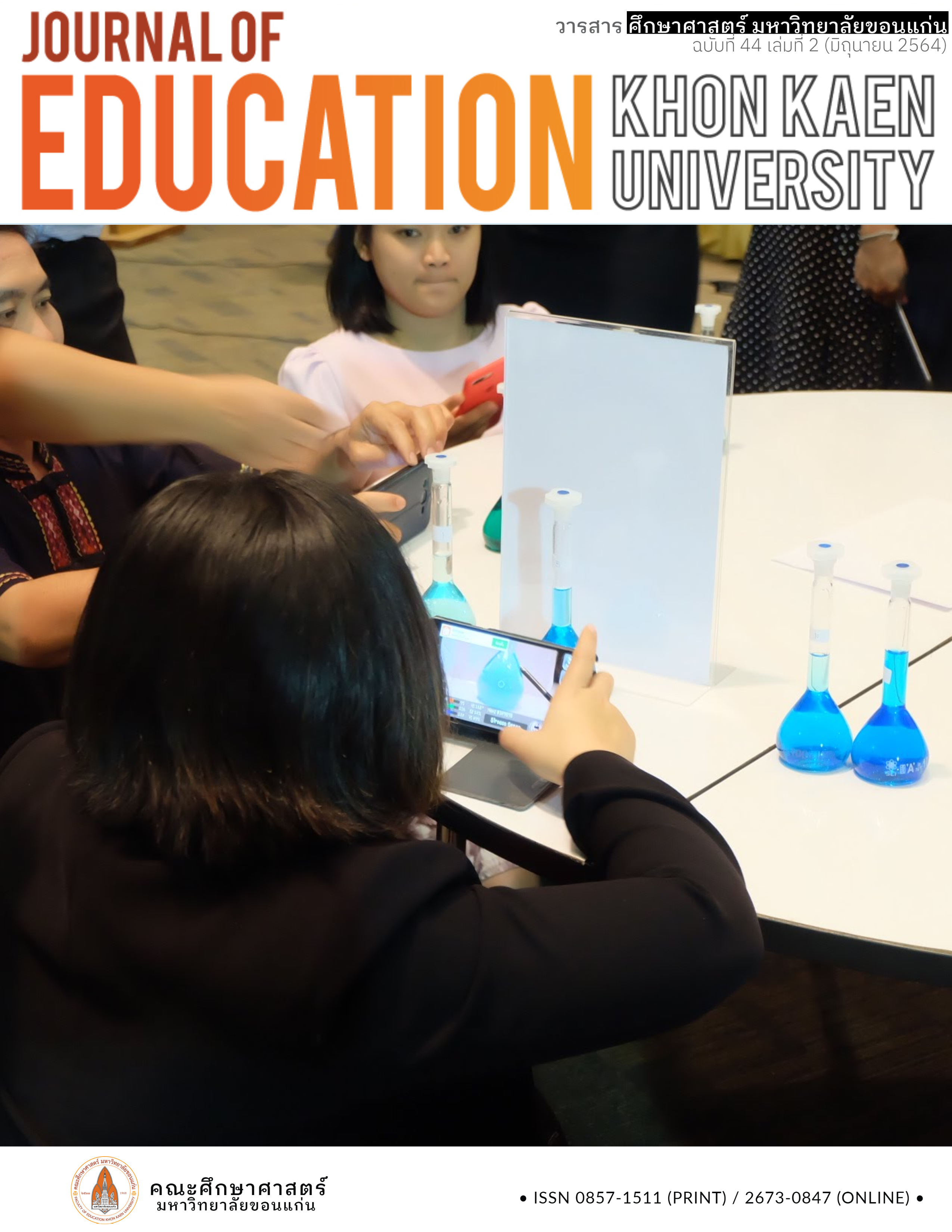ปัจจัยด้านทักษะทางพฤติกรรมที่มีอิทธิพลต่อผลสัมฤทธิ์ทางการเรียนของนักศึกษาระดับปริญญาตรี มหาวิทยาลัยขอนแก่น
Main Article Content
บทคัดย่อ
การเรียนในระดับอุดมศึกษาให้ประสบความสำเร็จจะต้องอาศัยหลายปัจจัยด้วยกัน ไม่ว่าจะเป็น ร่างกาย เชาวน์ปัญญา สุขภาพจิต และทักษะทางพฤติกรรมในการจัดการกับปัญหาต่าง ๆ ทั้งนี้ องค์ความรู้เกี่ยวกับปัจจัยที่มีอิทธิพลต่อความสามารถด้านการเรียนของนักศึกษามีความสำคัญต่อการออกแบบการสอนเพื่อพัฒนาทักษะทางพฤติกรรมแก่นักศึกษาให้มีความเหมาะสมยิ่งขึ้น การศึกษาครั้งนี้ มีวัตถุประสงค์เพื่อศึกษาปัจจัยด้านทักษะทางพฤติกรรมที่มีอิทธิพลต่อผลสัมฤทธิ์ทางการเรียนของนักศึกษาระดับปริญญาตรี มหาวิทยาลัยขอนแก่น โดยมีกลุ่มตัวอย่าง คือ นักศึกษาระดับปริญญาตรี มหาวิทยาลัยขอนแก่น จำนวน 150 คน ทำการสุ่มด้วยวิธีการสุ่มแบบหลายขั้นตอน เครื่องมือที่ใช้ในการวิจัย ได้แก่ มาตรวัดการกำกับอารมณ์ สำหรับนักศึกษาระดับปริญญาตรี และแบบประเมินพลังสุขภาพจิตอาร์คิว เก็บรวบรวมข้อมูลด้วยแบบสอบถามออนไลน์ วิเคราะห์ข้อมูลโดยใช้สถิติการวิเคราะห์การถดถอยพหุคูณ ผลการวิจัย แสดงให้เห็นว่า การกำกับอารมณ์และพลังสุขภาพจิตสามารถร่วมกันทำนายผลสัมฤทธิ์ทางการเรียนของนักศึกษาระดับปริญญาตรี มหาวิทยาลัยขอนแก่น นอกจากนี้ยังพบว่า การกำกับอารมณ์มีอิทธิพลทางลบต่อผลสัมฤทธิ์ทางการเรียน สะท้อนให้เห็นว่า นักศึกษาที่มีความสามารถในการกำกับอารมณ์สูงอาจไม่ได้เป็นผู้ที่มีผลสัมฤทธิ์ทางการเรียนสูง ทั้งนี้ อาจเนื่องมาจากการประเมินผลสัมฤทธิ์ทางการเรียนมุ่งเน้นไปที่การประเมินองค์ความรู้หรือความสามารถทางปัญญาซึ่งไม่ได้มีความสัมพันธ์โดยตรงกับการกำกับอารมณ์ที่เกี่ยวข้องกับการจัดการอารมณ์เพื่อให้แสดงออกได้อย่างเหมาะสมเป็นผลให้การจัดการปัญหามีประสิทธิภาพมากขึ้น อย่างไรก็ตาม ปัจจุบันการศึกษาการกำกับอารมณ์ที่เกี่ยวข้องกับผลสัมฤทธิ์ทางการเรียนยังไม่แพร่หลายมากนักจึงควรมีการศึกษาเพิ่มเติมเพื่อให้สามารถอธิบายความสัมพันธ์ระหว่างตัวแปรได้มากยิ่งขึ้น
Article Details
เอกสารอ้างอิง
ชนิตา รุ่งเรือง. (2563). รายงานการวิจัยเรื่อง การพัฒนามาตรวัดการกำกับอารมณ์สำหรับนักศึกษาระดับปริญญาตรี. มหาสารคาม: คณะศึกษาศาสตร์ มหาวิทยาลัยมหาสารคาม.
ชนิตา รุ่งเรือง. (อยู่ระหว่างการตีพิมพ์). การพัฒนามาตรวัดการกำกับอารมณ์สำหรับนักศึกษาระดับปริญญาตรี. วารสารการวัดผลการศึกษา มหาวิทยาลัยมหาสารคาม.
ชนัดดา เพ็ชรประยูร ชูศรี เลิศรัตน์เดชากุล และ นนทิรัตน์ พัฒนภักดี. (2554). ความสามารถในการปรับตัวของนักศึกษาชั้นปีที่ 1 ในมหาวิทยาลัยของรัฐ. วารสารวิชาการพระจอมเกล้าพระนครเหนือ, 21(1), 157-166.
นิลญา อาภรณ์กุล และ ศิริลักษณ์ ศุภปีติพร. (2017) การปรับตัวและปัจจัยที่เกี่ยวข้องกับการปรับตัวของนักศึกษาแพทย์ชั้น ปีที่ 1. Chulalongkorn Medical Journal, 61(5), 631-645.
สมพร อินทร์แก้ว, เยาวนาฎ ผลิตนนทเกียรติ, ศรีวิภา เอี่ยมสะอาด และ สายศิริ ด่านวัฒนะ. (2563). คู่มือเปลี่ยนร้ายกลายเป็นดี: พลังสุขภาพจิต (พิมพ์ครั้งที่ 2). นนทบุรี: สำนักสุขภาพจิตสังคม กรมสุขภาพจิต กระทรวงสาธารณสุข.
Bastian, V., Burns, N., & Nettelbeck, T. (2005). Emotional intelligence predicts life skills, but not as well as personality and cognitive abilities. Personality and Individual Differences, 39, 1135-1145.
Denham, S. A., Bassett, H. H., Mincic, M., Kalb, S. C., Way, E., Wyatt, T., & Segal, Y. (2012). Social emotional learning profiles of preschoolers' early school success: A person centered approach. Learning and Individual Differences, 22, 178–189.
Gillespie, S. M., & Beech, A. R. (2016). The wiley handbook on the theories, assessment, and treatment of sexual offending. John Wiley & Sons, Ltd. DOI: 10.1002/9781118574003.wattso012
Gross, J. J. (2002). Emotion regulation: Affective, cognitive, and social consequences. Psychophysiology, 9(3), 281-291. doi: 10.1017.S0048577201393198
Hair, J. F., Black, W. C., Babin, B. J., & Anderson, R. E. (2018). Multivariate data analysis (8th ed.). United Kingdom: Cengage Learning.
Harerimana, J. P. (2019). Promoting non-cognitive skills: A classroom practice. International Journal of Research and Scientific Innovation, VI(XI), 209-210.
John, O. P., & Gross, J. J. (2004). Healthy and unhealthy emotion regulation: Personality processes, individual differences, and life span development. Journal of Personality, 72(6), 1301-1333.
Koole, S. L. (2009). The psychology of emotion regulation: An integrative review. Cognition and Emotion, 23 (1), 4-41.
Levine S. (2003). Psychological and social aspects of resilience: A synthesis of risks and resources. Dialogues in clinical neuroscience, 5(3), 273–280. https://doi.org/10.31887/DCNS.2003.5.3/slevine
Lichtenfeld, S., Pekrun, R., Stupnisky, R. H., Reiss, K., & Murayama, K. (2012). Measuring students' emotions in the early years: The achievement emotions questionnaire —elementary school (AEQ-E). Learning and Individual Differences, 22, 190–201.
Lipnevich, A. A., & Roberts, R. D. (2014). Noncognitive skills in education: Emerging research and applications in a variety of international contexts. Learning and Individual Differences, 22, 173–177.
MacCann, C., Lipnevich, A. A., Burrus, J., & Roberts, R. D. (2012). Students' emotions during homework: Structures, self-concept antecedents, and achievement outcomes. Learning and Individual Differences, 22, 225–234.
Madelon J., Tim H., Kim V. B., Stefan S., Christoph M., & Rolf V. D. V. (2021) Effects of participation in excellence programs on cognitive and non-cognitive skills among higher education students in the Netherlands, European Journal of Higher Education, 11(1), 44-63.
Nath S, Ghosh S, and Das S. (2015). Relation between intelligence, emotional intelligence, and academic performance among medical interns. Open Journal of Psychiatry & Allied Sciences, 6, 96-100.DOI: 10.5958/2394-2061.2015.00004.X
Newsome, S., Day, A., & Catano, V. (2000). Assessing the predictive validity of emotional intelligence. Personality and Individual Differences, 29, 1005-1016. http://dx.doi.org/10.1016/S0191-8869(99)00250-0
Ogundokun, M., & Adeyemo, D.A. (2010). Emotional intelligence and academic achievement: The moderating influence of age, intrinsic and extrinsic motivation. The African Symposium, 10(2), 127-141.
Ong E., & Thompson, C. (2019). The importance of coping and emotion regulation in the occurrence of suicidal behavior. Psychological Reports, 122(4), 1192– 1210.
Purnamaningsih, E. H. (2017). Personality and emotion regulation strategies. International Journal of Psychological Research, 10(1), 53-60. DOI 10.21500/20112084.2040.
Rosen, J., Glennie, E., Dalton, B., Lennon, J., & Bozick, R. (2010). Noncognitive Skills in the Classroom: New perspectives on educational research. Research Triangle Institute Press.
Saklofske, D., Austin, E., Mastoras, S., Beaton, L., & Osborne, S. (2012). Relationships of personality, affect emotional intelligence and coping with student stress and academic success: Different patterns of association for stress and success. Learning and Individual Differences, 22, 251–257.
Sánchez-Álvarez, N., Berrios Martos, M.P., and Extremera, N. (2020). A meta-analysis of the relationship between emotional intelligence and academic performance in secondary education: A multi-stream comparison. Front. Psychol, 11(1517), 1-11. DOI: 10.3389/fpsyg.2020.01517
Schutte, N.S., Malouff, J.M., Hall, L.E., Haggerty, D.J., Cooper, J.T., Golden, C.J., and Dornheim, G.L. (1998). Development and validation of a measure of emotional intelligence. Personality and Individual Differences, 25(2), 167-177.
Thompson, R. A. (1994). Emotion regulation: A theme in search of a definition. Monographs of the Society for Research in Child Development, 59 (2/3), 25–52.
Wanzer, D., Postlewaite, E., & Zargarpour, N. (2019). Relationships among noncognitive factors and academic performance: testing the University of Chicago Consortium on school research model. AERA Open. https://doi.org/10.1177/2332858419897275


